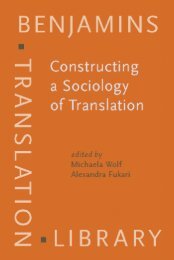Hermeneutics and Translation Theory.pdf
Hermeneutics and Translation Theory.pdf
Hermeneutics and Translation Theory.pdf
You also want an ePaper? Increase the reach of your titles
YUMPU automatically turns print PDFs into web optimized ePapers that Google loves.
Iranian Translators Cyber Association Articleslanguage comes to humans with meaning, interpretations <strong>and</strong> underst<strong>and</strong>ings of the world cannever be prejudice-free. As human beings, one cannot step outside of language <strong>and</strong> look atlanguage or the world from some objective st<strong>and</strong>point. Language is not a tool which humanbeings manipulate to represent a meaning-full world; rather, language forms human reality.(quoted from Bullock, 1997)Another important figure in this sphere is Schleiermacher whose concept of underst<strong>and</strong>ingincludes empathy as well as intuitive linguistic analysis. He believed that underst<strong>and</strong>ing is notmerely the decoding of encoded information, interpretation is built upon underst<strong>and</strong>ing, <strong>and</strong> ithas a grammatical, as well as a psychological moment. The grammatical thrust places the textwithin a particular literature (or language) <strong>and</strong> reciprocally uses the text to redefine the characterof that literature. The psychological thrust is more naive <strong>and</strong> linear. In it, the interpreterreconstructs <strong>and</strong> explicates the subject's motives <strong>and</strong> implicit assumptions. Thus Schleiermacherclaimed that a successful interpreter could underst<strong>and</strong> the author as well, as or even better than,the author understood himself because the interpretation highlights hidden motives <strong>and</strong>strategies. (quoted from the web: www.ai.mit.edu)Dilthey, initially a follower of Schleiermacher, went further. He began to emphasize that texts<strong>and</strong> actions were as much products of their times as expressions of individuals, <strong>and</strong> theirmeanings were consequently constrained by both an orientation to values of their period <strong>and</strong> aplace in the web of their authors' plans <strong>and</strong> experiences. Therefore meanings are delineated bythe author's world-view reflecting a historical period <strong>and</strong> social context. Underst<strong>and</strong>ing(verstehen), the basis for methodological hermeneutics, involves tracing a circle from text to theauthor's biography <strong>and</strong> immediate historical circumstances <strong>and</strong> back again. Interpretation, or thesystematic application of underst<strong>and</strong>ing to the text, reconstructs the world in which the text wasproduced <strong>and</strong> places the text in that world. (ibid)Modern ideas on hermeneutics hold that the writer may be an editor or a redactor <strong>and</strong> that hemay have used sources. In considering this aspect of discourse one must take into account thewriter's purpose in writing as well as his cultural milieu. Secondly, one must consider thenarrator in the writing who is usually different from the writer. Sometimes he is a real person,2
















